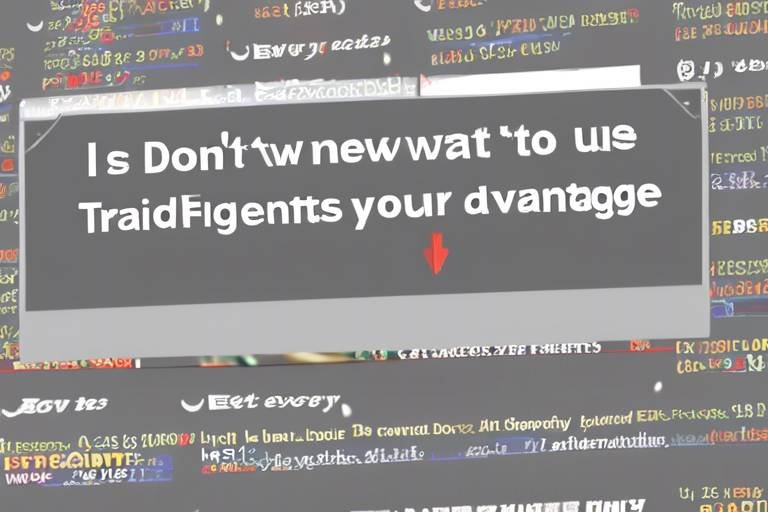How to Utilize Social Media for Trading Insights
In today's fast-paced financial world, social media has emerged as a game changer for traders seeking an edge in the market. Imagine having a tool that not only connects you with fellow traders but also provides real-time insights and updates on market trends. That's precisely what social media offers! From Twitter to Reddit, these platforms have transformed the way traders analyze information, identify trends, and engage with a community of like-minded individuals. This article delves into the powerful role social media plays in trading, offering insights on how traders can leverage these platforms for market analysis, trend identification, and community engagement.
Social media has revolutionized trading by providing instant access to a wealth of information. Gone are the days when traders relied solely on traditional news outlets for updates. Nowadays, platforms like Twitter, Instagram, and TikTok are buzzing with real-time discussions that can significantly influence market sentiment. Have you ever noticed how a single tweet can send a stock soaring or crashing? This phenomenon showcases how social media shapes decisions among both amateur and professional traders. The ability to gauge public sentiment and market reactions in real-time can help you make informed trading decisions, ultimately enhancing your strategy.
In a sea of information, discerning credible sources is crucial. With countless accounts sharing opinions, it's easy to get lost in the noise of misinformation. So, how do you sift through the chaos? Start by identifying trustworthy accounts that consistently provide valuable trading insights. Look for profiles with a strong following, verified badges, and a history of accurate predictions. Engaging with reputable trading platforms can also be beneficial. Here are some tips to help you spot reliable sources:
- Check for verified accounts.
- Look for transparency in their trading results.
- Follow accounts that share educational content.
- Engage with community feedback on their insights.
Connecting with experienced traders can provide unique perspectives that enrich your trading journey. Following influential figures in the trading community allows you to tap into their expertise and insights. These traders often share their strategies, market analyses, and personal experiences, which can significantly enhance your own trading strategy. Think of it as having a mentor who shares their wisdom, helping you navigate the complexities of trading with greater confidence.
Participating in trading forums and groups fosters knowledge sharing and community support. Engaging with fellow traders enables you to exchange ideas, strategies, and experiences that can improve your trading outcomes. Whether it's through Facebook groups, Discord channels, or Reddit threads, these communities are invaluable for gaining insights and staying updated on market trends. Don't hesitate to ask questions or share your own experiences; the more you engage, the more you'll learn!
Hashtags can streamline the search for relevant trading discussions. By effectively using hashtags, you can discover trending topics and insights that align with your trading interests. For instance, if you're interested in cryptocurrency, searching for hashtags like #CryptoTrading or #BitcoinAnalysis can lead you to valuable discussions and resources. This technique can save you time and help you stay informed about the latest market developments.
Social media offers a wealth of data on market trends, making it an excellent resource for traders. By analyzing sentiment and trends through various platforms, you can enhance your ability to make informed trading decisions. Look for patterns in discussions, monitor the frequency of certain topics, and gauge the overall sentiment towards specific stocks or assets. This analysis can provide you with a competitive edge, allowing you to anticipate market movements before they happen.
A well-defined strategy is key to maximizing social media's potential in trading. Developing a personalized social media strategy that aligns with your trading goals and preferences can significantly enhance your trading experience. Start by setting clear objectives for your social media engagement. Are you looking to gather information, build a network, or share your insights? Once you have your goals in mind, you can tailor your social media activities accordingly.
Establishing clear goals can guide your social media interactions. Consider what you hope to achieve through your engagement. Whether it's increasing your knowledge, connecting with other traders, or sharing your own insights, having specific objectives will keep you focused and motivated. Setting achievable goals ensures that your social media activities contribute positively to your trading success.
Monitoring the effectiveness of your social media strategy is essential for continuous improvement. Evaluate your performance regularly by analyzing engagement metrics, follower growth, and the quality of insights gained. Don’t be afraid to make necessary adjustments to optimize your engagement and insights. Remember, the trading landscape is constantly changing, and so should your strategy!
Q1: How can I start using social media for trading insights?
A1: Begin by following reputable traders and engaging with trading communities. Utilize hashtags to find relevant discussions and stay updated on market trends.
Q2: What should I look for in a reliable trading source on social media?
A2: Look for verified accounts, transparency in trading results, and accounts that provide educational content.
Q3: How can I measure the success of my social media strategy?
A3: Monitor engagement metrics, follower growth, and the quality of insights gained to assess your strategy's effectiveness.

The Impact of Social Media on Trading
Social media has dramatically transformed the landscape of trading, acting as a catalyst for real-time information exchange and market sentiment analysis. Imagine being able to tap into a global network of traders, all sharing insights, strategies, and news at the click of a button. This unprecedented access to information can shape trading decisions like never before, making it essential for both amateur and professional traders to navigate this digital realm effectively.
With platforms like Twitter, Reddit, and even Instagram, traders can engage in discussions, share charts, and analyze trends instantaneously. The impact is profound; a single tweet from an influential trader or a viral post can sway market sentiment, leading to rapid price movements. For instance, when a well-known figure expresses optimism about a specific stock, it can trigger a buying frenzy, while negative sentiments can lead to panic selling. This phenomenon illustrates how social media can create a domino effect in trading, where the collective sentiment can dictate market movements.
Moreover, social media allows for the democratization of information. No longer are traders solely reliant on traditional financial news outlets. Instead, they can access a plethora of opinions and analyses from diverse sources. However, this abundance of information comes with its challenges. The risk of misinformation is high, and distinguishing between credible insights and noise is crucial for successful trading. Traders must develop a keen eye for identifying reliable sources amidst the chaos of social media.
In addition to sentiment analysis, social media platforms serve as valuable tools for identifying emerging trends. By following specific hashtags or keywords related to trading, individuals can stay updated on the latest market movements and discussions. For example, tracking hashtags like #StockMarket or #CryptoTrading can lead traders to insightful conversations and analyses that they might have otherwise missed.
Furthermore, social media fosters a sense of community among traders. Engaging with others who share similar interests not only enhances learning but also provides emotional support during the inevitable ups and downs of trading. By participating in discussions, traders can exchange ideas, share successes, and learn from failures, creating a collaborative environment that can improve overall trading outcomes.
In summary, the impact of social media on trading is both profound and multifaceted. It has revolutionized the way traders access information, engage with each other, and analyze market trends. However, with great power comes great responsibility. Traders must approach social media with a critical mindset, ensuring they leverage its benefits while mitigating the risks of misinformation and emotional decision-making.
- How can I find reliable trading information on social media? Look for accounts with a strong reputation, verified status, and consistent engagement from their followers.
- What platforms are best for trading insights? Twitter and Reddit are popular for real-time discussions, while Instagram can provide visual insights through charts and infographics.
- Can social media affect stock prices? Yes, social media can influence trader sentiment, leading to significant price movements based on collective reactions.
- How do I avoid misinformation on social media? Always cross-reference information with trusted financial news sources and follow accounts known for their accuracy.

Identifying Reliable Sources
In the chaotic world of social media, where information flies around faster than a speeding bullet, it’s easy to get lost in the noise. Traders often find themselves overwhelmed by the sheer volume of content available at their fingertips. So, how do you sift through the clutter to find reliable sources that can truly enhance your trading experience? The answer lies in a few key strategies that can help you identify trustworthy accounts and platforms.
First and foremost, it’s essential to evaluate the credibility of the sources you encounter. Look for verified accounts on platforms like Twitter or Instagram, as these are often marked with a checkmark, indicating authenticity. Additionally, consider the following criteria when assessing the reliability of a source:
- Experience: Check the background of the trader or analyst. Do they have a history of successful trades or a solid track record in the industry?
- Engagement: Reliable sources often have a significant following and engage actively with their audience. Look for accounts that respond to comments and share insightful content regularly.
- Transparency: Trustworthy traders are open about their strategies and outcomes. They share not only their successes but also their failures, which provides a more realistic view of trading.
Moreover, it’s wise to cross-reference information from multiple sources. If a particular trading strategy or market analysis is being discussed across several reputable accounts, it’s more likely to be credible. Think of it as triangulating your position on a map; the more points of reference you have, the clearer your destination becomes.
Additionally, be wary of sensationalist claims. If a source promises guaranteed profits or seems too good to be true, it probably is. Always approach such claims with skepticism. A good rule of thumb is to ask yourself: Does this information align with what I already know? If it contradicts established facts without substantial evidence, it’s best to steer clear.
Another effective way to identify reliable sources is to engage with trading communities. By participating in forums or groups, you can gain insights into which accounts are highly regarded by fellow traders. This community-driven approach not only helps in finding credible sources but also fosters valuable discussions and knowledge sharing.
In conclusion, while social media can be a treasure trove of trading insights, it’s crucial to navigate it wisely. By focusing on credibility, cross-referencing information, and engaging with the community, you can uncover reliable sources that will enhance your trading strategies and decisions. Remember, in trading as in life, quality trumps quantity—it’s all about the right information at the right time.

Follow Influential Traders
In the fast-paced world of trading, keeping up with the latest trends and insights can feel overwhelming. One of the most effective ways to navigate this landscape is by following influential traders on social media. These seasoned professionals often share their strategies, analyses, and market predictions, providing you with a wealth of information that can enhance your own trading journey. Imagine having a mentor who shares their insights with you daily; this is precisely what following influential traders can offer.
When you follow these traders, you gain access to unique perspectives that can help you understand market movements better. They often discuss their reasoning behind certain trades, which can illuminate the thought processes that go into successful trading. For example, consider how a well-known trader might react to a sudden market shift. By observing their reactions and strategies, you can learn to adapt your own approach in real-time. This kind of learning is invaluable, especially when the market is volatile.
However, it's essential to choose the right influencers to follow. Not all traders have the same level of experience or success, so it’s important to do your homework. Look for traders who not only have a solid track record but also engage with their followers. A trader who takes the time to explain their thought process and answer questions is far more valuable than one who simply posts their trades without context. Here are a few tips to help you identify the right influencers:
- Experience: Check how long they have been trading and their success rate.
- Engagement: Look for those who actively interact with their audience.
- Transparency: Influencers who share both wins and losses can provide a more realistic view of trading.
Moreover, following influential traders can also help you stay updated on market news and trends. Many traders share relevant articles, news, and data that can impact trading decisions. By keeping an eye on their feeds, you can quickly gather insights that might take hours of research otherwise. Think of it as having a curated news feed tailored specifically for your trading needs.
In addition, many influential traders host live trading sessions or webinars, offering a chance to see their strategies in action. Participating in these events can provide you with practical knowledge and allow you to ask questions in real-time. It's like having a front-row seat to a masterclass in trading! So, don’t just passively consume their content; engage with it. Ask questions, share your thoughts, and become part of the conversation.
Ultimately, following influential traders is about building a network of knowledge. By surrounding yourself with experienced voices in the trading community, you can enhance your understanding, refine your strategies, and ultimately improve your trading outcomes. Just remember, while these traders can provide valuable insights, it’s crucial to develop your own trading style and not solely rely on others' opinions. Use their insights as a guide, but trust your instincts and research.
Q: How do I find influential traders to follow?
A: Start by researching popular trading platforms or forums where experienced traders share their insights. Look for traders with a strong following and positive feedback from their audience.
Q: Should I follow traders from different markets?
A: Yes! Following traders from various markets can provide you with a broader perspective and help you identify trends that may not be apparent in your primary trading focus.
Q: What if I disagree with an influencer's strategy?
A: It's perfectly okay to have differing opinions! Use their insights to challenge your own strategies and think critically about your trading decisions.

Engagement with Trading Communities
Engaging with trading communities can be a game changer for both novice and seasoned traders alike. Imagine walking into a bustling marketplace filled with traders sharing their insights, tips, and experiences. That’s what online trading communities offer—a vibrant space where ideas flow freely, and knowledge is shared generously. By participating in these communities, you not only gain access to a wealth of information but also build valuable connections that can enhance your trading journey.
One of the most significant advantages of engaging with trading communities is the opportunity to exchange ideas with like-minded individuals. Whether you’re discussing the latest market trends or sharing your trading strategies, being part of a community allows you to learn from others’ successes and failures. This collaborative environment can lead to new insights that you might not have considered on your own. Additionally, many communities host webinars, live trading sessions, and Q&A forums that can further deepen your understanding of the market.
Moreover, trading communities often have a diverse range of members—from beginners to experts—each bringing their unique perspectives to the table. This diversity can be incredibly enriching. For instance, a beginner might ask questions that prompt experienced traders to revisit fundamental concepts, leading to a deeper collective understanding. By engaging in discussions, you not only contribute to the community but also reinforce your knowledge, making it a win-win situation.
To maximize your engagement, consider the following tips when participating in trading communities:
- Be Active: Regular participation helps you stay updated and shows your commitment.
- Ask Questions: Don’t hesitate to seek clarification on topics you find challenging. Chances are, others have the same questions.
- Share Your Experiences: Your insights could help someone else avoid common pitfalls or inspire new strategies.
- Respect Different Opinions: The beauty of trading communities lies in diverse viewpoints. Embrace the discussions that challenge your perspective.
In addition to these tips, remember that engagement is not just about gaining knowledge; it’s also about building relationships. Networking with fellow traders can lead to mentorship opportunities, partnerships, or even friendships that extend beyond trading. You might find a trading buddy who shares your interests, or a mentor who can guide you through more complex strategies. These connections can provide emotional support during the inevitable ups and downs of trading.
Finally, don’t forget to contribute positively to the community. Share valuable resources, provide constructive feedback, and celebrate the successes of others. This not only enhances your reputation within the community but also creates a supportive environment that encourages everyone to thrive. In the fast-paced world of trading, having a strong community behind you can make all the difference.
Q: How can I find trading communities to join?
A: You can find trading communities on social media platforms like Twitter, Facebook, and Reddit, as well as dedicated trading forums and Discord channels. Look for groups that align with your trading style and interests.
Q: Are all trading communities reliable?
A: Not all trading communities are created equal. It’s essential to do your research and follow reputable groups with experienced members. Look for communities that promote transparency and provide valuable insights.
Q: How much time should I dedicate to engaging with trading communities?
A: The amount of time you dedicate depends on your personal schedule and trading goals. Even spending a few hours a week can significantly enhance your knowledge and network.
Q: Can I benefit from engaging with trading communities if I’m a beginner?
A: Absolutely! Trading communities are an excellent resource for beginners. You can learn from others’ experiences, ask questions, and gain insights that can help you navigate the trading landscape more effectively.

Utilizing Hashtags for Research
Hashtags are like the breadcrumbs of the digital world, guiding you through the vast forest of information available on social media. When it comes to trading, using hashtags effectively can significantly enhance your research capabilities. Imagine trying to find a needle in a haystack; hashtags are the magnet that pulls that needle closer to you. By categorizing content, hashtags allow traders to quickly filter through the noise and hone in on discussions that matter.
To get started, it’s essential to understand the types of hashtags that can be beneficial for your trading research. Here are a few categories to consider:
- Market-Specific Hashtags: These relate directly to the markets you’re interested in, such as #Forex, #Crypto, or #StockMarket.
- Event-Driven Hashtags: Use these during significant market events or announcements, like #EarningsSeason or #FedMeeting.
- Sentiment Analysis Hashtags: Tags like #BullMarket or #BearMarket can help you gauge the overall market sentiment.
By incorporating these hashtags into your social media searches, you can uncover a wealth of insights and opinions from other traders. For instance, searching for #CryptoNews on Twitter will yield a stream of real-time updates, opinions, and analyses that can inform your trading decisions. However, it’s crucial to not just follow the trends but to critically evaluate the information you encounter. Look for patterns in the discussions, and don’t hesitate to engage with others to deepen your understanding.
Another powerful aspect of hashtags is their ability to connect you with niche communities. For example, if you're interested in trading penny stocks, using a hashtag like #PennyStocks can lead you to specialized groups and discussions where traders share their strategies and experiences. This community engagement not only enriches your knowledge but can also lead to valuable networking opportunities.
Finally, remember that the landscape of social media is ever-changing. What’s trending today may not be relevant tomorrow. Therefore, staying updated on the latest hashtags in the trading community is vital. Regularly check platforms like Twitter and Instagram, and even consider using tools that track trending hashtags to keep your research fresh and relevant. By doing so, you'll ensure that your trading insights are based on the most current information available.

Analyzing Market Trends
In the fast-paced world of trading, is not just a skill; it's an art form that can make or break your trading strategy. Social media platforms, with their vast pools of real-time data, serve as a treasure trove for traders looking to gauge market sentiment and identify emerging trends. Imagine standing at the edge of a vast ocean of information, where each wave represents a new trend or sentiment shift. The challenge lies in learning how to ride those waves effectively.
One of the most effective techniques for analyzing market trends on social media is through sentiment analysis. This involves evaluating the tone of discussions surrounding specific stocks or commodities. Are traders feeling bullish or bearish? Are there signs of panic or excitement? By monitoring keywords and phrases, you can gain insights into the collective mood of the market. Tools like Google Trends and various sentiment analysis software can help you quantify these feelings and turn them into actionable insights.
Another method is to observe the volume of discussions around particular assets. A sudden spike in mentions could indicate growing interest or concern. For instance, if you notice a surge in tweets about a particular stock, it might be worth investigating further. You can track these discussions by using specific hashtags or by following key influencers in the trading community. Hashtags like #trading, #stocks, and #forex can be your compass in navigating these waters.
Additionally, visualizing data can be incredibly helpful in trend analysis. Consider creating charts that plot social media mentions against price movements. This can reveal correlations that are not immediately apparent. For example, you might find that a stock's price tends to rise after a surge in positive sentiment on Twitter. By establishing these patterns, you can make more informed decisions about when to enter or exit trades.
Moreover, engaging with the community can provide you with anecdotal evidence that complements your data analysis. Join trading forums and participate in discussions. Ask questions and share your observations. Often, the insights gained from real conversations can be just as valuable as any data point. Remember, trading is not just about numbers; it's about understanding the human emotions that drive those numbers.
To summarize, analyzing market trends through social media requires a blend of data analysis, community engagement, and a keen eye for sentiment. By leveraging these techniques, you can enhance your trading strategy and navigate the complexities of the market with greater confidence.
- How can I effectively use social media for trading insights?
Start by following influential traders, engaging with trading communities, and utilizing hashtags to stay updated on market trends. - What tools can assist in sentiment analysis?
Tools like Google Trends and various sentiment analysis software can help you gauge market sentiment and identify trends. - Is it necessary to engage with trading communities?
Yes, engaging with communities allows for knowledge sharing and can provide unique insights that enhance your trading strategies. - How do I visualize data for trend analysis?
Create charts that plot social media mentions against price movements to identify correlations and patterns.

Creating a Social Media Strategy
In today's fast-paced trading environment, having a well-defined social media strategy is not just an option; it’s a necessity. With the vast amount of information available at our fingertips, it’s easy to get overwhelmed and lose sight of your trading goals. A solid strategy helps you cut through the noise and focus on what truly matters. So, how do you go about crafting this strategy? Let's dive into the essential steps that can guide you.
First off, it’s important to understand that your social media strategy should align with your overall trading objectives. Ask yourself: What do I want to achieve through social media? Whether it's gaining insights into market trends, connecting with other traders, or simply staying updated on financial news, having clear objectives will direct your efforts effectively. Consider setting specific goals, such as:
- Increasing your engagement with trading communities by 30% in the next quarter.
- Identifying at least five credible trading influencers to follow each month.
- Participating in relevant discussions and sharing insights at least twice a week.
Once you have your goals set, the next step is to choose the right platforms. Not all social media channels are created equal when it comes to trading insights. For example, Twitter is fantastic for real-time updates and quick interactions, while LinkedIn might be more suitable for in-depth articles and professional networking. Analyze where your target audience is most active and tailor your presence accordingly. This will ensure that your efforts yield the best results.
Another critical aspect of your strategy is to engage authentically. Social media is not just about broadcasting your thoughts; it's about building relationships. Take the time to interact with other traders, respond to comments, and participate in discussions. This not only enhances your visibility but also fosters a sense of community. Remember, trading can often feel isolating, and connecting with others can provide valuable support and insights.
Finally, don’t forget to regularly evaluate your strategy. Ask yourself: Is what I’m doing working? Use analytics tools to track your engagement and the effectiveness of your posts. If certain types of content are resonating more than others, adjust your strategy accordingly. This iterative process will help you hone in on what works best for you and your trading style.
By following these steps, you'll be well on your way to creating a robust social media strategy that not only enhances your trading insights but also connects you with a community of like-minded individuals. As you embark on this journey, keep in mind that the world of trading is constantly evolving, and so should your approach to social media.
Q: How can I measure the success of my social media strategy?
A: You can measure success through engagement metrics such as likes, shares, comments, and follower growth. Additionally, track how these metrics correlate with your trading performance.
Q: What are some common mistakes to avoid when using social media for trading?
A: Avoid spreading misinformation, engaging in heated arguments, and focusing solely on self-promotion. Instead, aim for constructive interactions and share valuable insights.
Q: How often should I post on social media?
A: Consistency is key. Aim for a regular posting schedule that keeps you active without overwhelming your followers. Quality over quantity should be your guiding principle.

Setting Goals for Social Media Engagement
When diving into the vast ocean of social media, especially for trading, it’s essential to have a clear compass—your goals. Just like a ship needs a destination to navigate effectively, your social media engagement should be guided by well-defined objectives. Setting these goals not only helps you stay focused but also ensures that your interactions are meaningful and contribute to your overall trading success. So, what kind of goals should you consider?
First off, think about what you want to achieve with your social media presence. Are you looking to gather insights from other traders? Perhaps you want to build a network or even establish yourself as a thought leader in the trading community. Whatever your aim, having a clear vision will help you tailor your approach. For instance, if your goal is to learn from others, you might focus on following experienced traders and engaging in discussions that challenge your current understanding.
Next, it’s beneficial to set measurable objectives. This means defining specific metrics that can help you track your progress. Here are a few examples of measurable goals you might consider:
- Increase your follower count by 20% over the next three months.
- Engage in at least five discussions per week on trading forums.
- Share your own insights at least twice a week to build your credibility.
By establishing such targets, you can evaluate your effectiveness and adjust your strategies accordingly. Remember, it’s not just about quantity; the quality of your engagement matters too. Aim to foster genuine connections and provide value to your audience. This can be achieved through thoughtful comments, sharing insightful articles, or even creating your own content that resonates with your trading philosophy.
Lastly, don’t forget to regularly review and adjust your goals. The trading landscape—and social media—are constantly evolving. What works today might not be effective tomorrow. Set aside time each month to reflect on your progress, assess what strategies are yielding results, and make necessary adjustments. This adaptive approach will keep you agile in your trading journey and ensure that your social media engagement remains relevant and beneficial.
In summary, setting goals for social media engagement is not just about having a checklist; it’s about creating a roadmap that aligns with your trading aspirations. Whether you’re aiming to learn, connect, or share, a strategic approach will enhance your experience and outcomes in the trading world.
Q1: Why is it important to set goals for social media engagement in trading?
A1: Setting goals helps you stay focused, measure your progress, and ensure that your social media interactions contribute positively to your trading success.
Q2: How can I measure the success of my social media goals?
A2: You can measure success through metrics like follower growth, engagement rates, and the quality of interactions you have within trading communities.
Q3: Should I adjust my social media goals regularly?
A3: Yes, regularly reviewing and adjusting your goals is essential due to the dynamic nature of trading and social media. This ensures your strategies remain effective and relevant.

Measuring Success and Adjusting Strategies
In the fast-paced world of trading, simply participating on social media isn’t enough; you need to measure your success and adjust your strategies accordingly. Think of it like navigating a ship in turbulent waters. Without a compass, you could easily drift off course. The same goes for your social media engagement. So, how do you keep your trading ship sailing smoothly?
First and foremost, it’s essential to establish key performance indicators (KPIs) that align with your trading goals. These KPIs could include metrics such as the number of insightful trades influenced by social media, the engagement rate on your posts, or even the growth of your follower base. By tracking these metrics, you can gain valuable insights into what’s working and what isn’t. For instance:
| Metric | Description | Importance |
|---|---|---|
| Engagement Rate | Measures likes, shares, and comments on your posts. | Indicates how well your content resonates with your audience. |
| Follower Growth | Tracks the increase in your followers over time. | Shows your growing influence in the trading community. |
| Trade Performance | Evaluates the success of trades influenced by social media. | Helps assess the effectiveness of insights gained from platforms. |
Once you’ve established these KPIs, the next step is to regularly analyze your data. This doesn’t mean you should obsess over every little detail, but rather look for trends and patterns that can inform your future strategies. For example, if you notice a spike in engagement during a particular trading event, it might be worth exploring similar topics in the future. On the flip side, if certain posts consistently underperform, consider tweaking your content or the platforms you’re using.
Moreover, don’t forget the importance of feedback. Engaging with your audience can provide you with invaluable insights into what they find helpful or interesting. Ask questions, encourage discussions, and be open to constructive criticism. This two-way interaction can not only enhance your content but also foster a sense of community among your followers.
Lastly, remember that the trading landscape is always changing, and so should your strategies. If you find that specific tactics aren’t yielding the desired results, don’t hesitate to pivot. The ability to adapt is a crucial skill for any trader. By continuously measuring your success and adjusting your strategies, you’ll not only improve your trading outcomes but also solidify your presence in the social media trading arena.
- How often should I review my social media strategy? It's best to review your strategy at least once a month to ensure it aligns with your trading goals.
- What metrics are most important for measuring success? Focus on engagement rate, follower growth, and trade performance to gauge the effectiveness of your social media efforts.
- How can I improve my engagement on social media? Post consistently, engage with your audience, and share valuable insights or tips that resonate with your followers.
- Is it necessary to follow every trending topic? No, focus on topics that are relevant to your trading strategy and audience.
Frequently Asked Questions
- How can social media impact my trading decisions?
Social media provides real-time information and insights that can significantly influence trading decisions. By monitoring trends, market sentiment, and the opinions of influential traders, you can make more informed choices that align with current market conditions.
- What are the best platforms for trading insights?
Popular platforms for trading insights include Twitter, Reddit, and specialized trading forums. These platforms allow you to connect with experienced traders and access a wealth of information, but it’s essential to verify the credibility of the sources you follow.
- How do I identify reliable sources on social media?
To identify reliable sources, look for accounts with a strong following, consistent engagement, and a history of accurate information. Pay attention to user feedback and reviews, and consider following well-known traders or analysts in the community.
- What role do hashtags play in finding trading insights?
Hashtags are invaluable for streamlining your search for relevant trading discussions. By using specific hashtags related to your interests, you can discover trending topics and insights that can help you stay updated on market movements.
- How can I create an effective social media strategy for trading?
Start by setting clear goals for your social media engagement, such as increasing your knowledge or connecting with other traders. Then, develop a plan that includes following influential accounts, participating in discussions, and regularly evaluating your engagement to ensure it aligns with your trading objectives.
- What should I measure to evaluate my social media strategy's success?
Key metrics to measure include engagement rates (likes, shares, comments), the number of new connections made, and the quality of insights gained. Regularly review these metrics to adjust your strategy and optimize your social media activities for better trading outcomes.



















